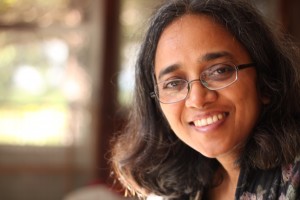A discussion from The Rising Dust workshop on why and how South Asian speculative fiction writers should gain inspiration from local cultures, mythologies and traditions for their stories.
On the second day of DWL’s The Rising Dust workshop, writer-instructor Usman T. Malik told the participants he had asked his friends, the speculative fiction writers Anil Menon and Vandana Singh, for some advice before the workshop.
Menon and Singh had conducted a similar speculative fiction writing workshop in Kanpur, India, in 2009. Usman said he asked them for suggestions for the workshop’s agenda and any tips for the participants.

Speculative Fiction Writer Anil Menon
In his message, Anil Menon, who is a leading Indian speculative fiction writer, hit upon an idea that perhaps comes closest to the theme of The Rising Dust workshop.
Menon wrote, “The writers could be reminded to use the world around them. A certain decolonization of the mind is necessary. We found local writers working in English were quite oblivious to how their views were based on western models of the future or technology or what facts count as significant.”
Usman supported Menon’s point. “I absolutely agree,” he said. “Western narrative is not the only model. We need to do our own writing ourselves and tap into our own culture to dig our own resources (for writing).”

Speculative Fiction Writer Vandana Singh
Vandana Singh elaborated on Menon’s point. She wrote in her message to Usman, “I especially agree with Anil’s comments about decolonization. If we are not aware of the dangers, we end up assuming futures consistent with dominant Western imaginings while unconsciously suppressing truly interesting alternatives.”
Singh also said some desi writers don’t realize they might be pandering to Western tastes by inadvertently perpetuating stereotypes.
“If one is writing for the world, one should at least peripherally be aware that Westerners will read into our work their prejudices, which you may not entirely be able to prevent, but if a writer is some species of truth-teller, then one should at least not be lazy and perpetuate stereotypes,” she said, in her message.
Singh urged the participants to “keep in touch with literatures in their mother tongues.”
“Some (writers) who are bilingual might want to try writing stories in both languages,” she said. “I think that feeds creativity and enriches one’s sense of language.”
Singh’s suggestion connected with the topic of Pakistani novelist Musharraf Ali Farooqi’s interactive discussions with the workshop participants.

Writer Musharraf Ali Farooqi
Farooqi informed the participants about the rich history and traditions of speculative fiction writing in the sub-continent. He also talked about the ways new South Asian English spec-fic writers can use local cultures, legends and mythologies as inspiration for their own writing.
Farooqi said even the Masnavi — a form of poetry that dates back to as early as the 4th century — had some fantastical elements such as supernatural creatures. In South Asia, he said, the Masnavi’s poetics influenced the poetics of future storytelling forms such as the Dastaan, which is an epic tale. With the Dastaan tradition, speculative fiction really took off. The sub-continent’s writers created fantasy tales by borrowing from Islamic heritage, Hindu mythology and occult arts as well as Indo-Greek and Ind0-Persian influences.
For the contemporary speculative fiction writers, Farooqi said they need to read up on these historical resources and literary forms. He said writers should develop an understanding of the sources of influence of these historical texts and then try and incorporate indigenous elements in their own narrative. He also advised writers to read contemporary vernacular literature.
“Read new Urdu writers,” Farooqi said. “Know about your traditions and make an attempt to read local writers.”
For Further Reading: In a subsequent correspondence with DWL, Anil Menon shared an article on Indian speculative fiction writing he had authored a few years ago. In the article, which is titled “World-Building in a Hot Climate” [link], Menon suggests it is both the disconnect from mainstream speculative fiction and a colonized mindset that are responsible for problems such as “premature obsolescence” and “world-reusing” in South Asian spec-fic writing.
Menon’s proposed solution to avoid these problems is a sense of dissatisfaction with the present conditions.
“I suggest the solution lies in discontent,” he writes in the article. “Discontent is an endless resource. Discontent is a natural human instinct, both contagious and easily kindled. Discontent makes hope possible. After all, one hopes for what one does not have… If SF writers were to start in a seething state of discontent, trembling like compass needles maddened by a private magnetism, then they could tear free and truly produce what Paramjit Kumar threatened in 1964: “the greatest science fiction of the century.””


















